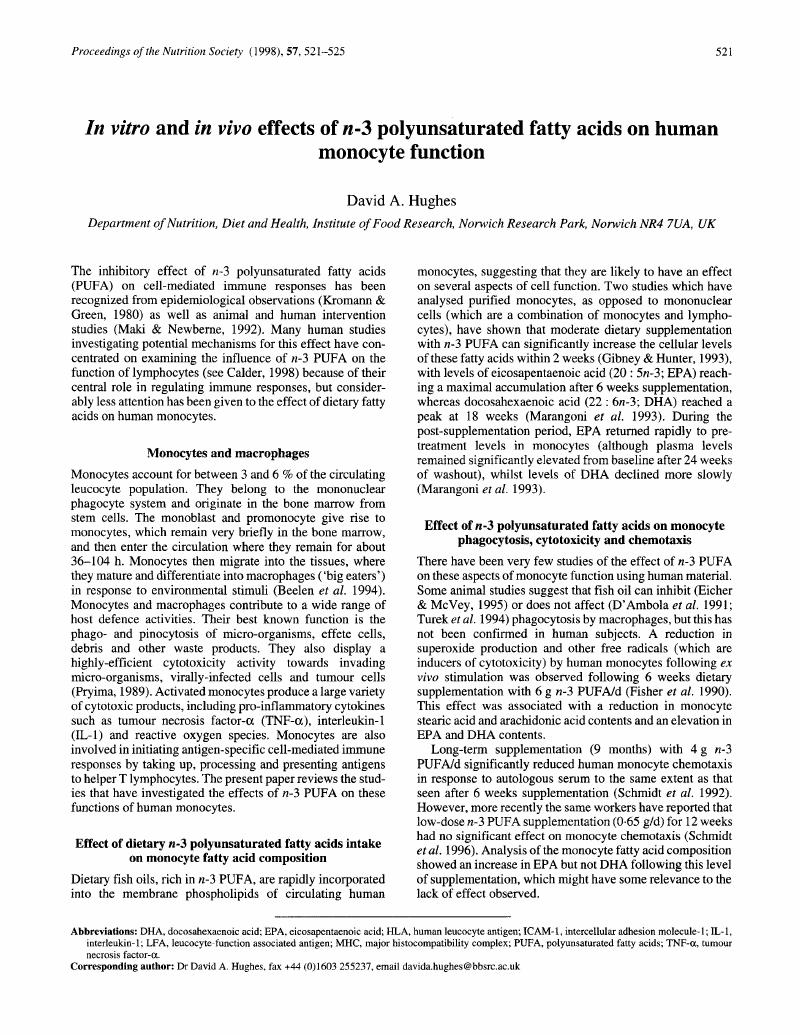Crossref Citations
This article has been cited by the following publications. This list is generated based on data provided by Crossref.
Calder, Philip C.
2001.
The ratio of n-6 to n-3 fatty acids in the diet: Impact on T lymphocyte function.
European Journal of Lipid Science and Technology,
Vol. 103,
Issue. 6,
p.
390.
Harbige, Laurence S.
and
Fisher, Benjamin A. C.
2001.
Dietary fatty acid modulation of mucosally-induced tolerogenic immune responses.
Proceedings of the Nutrition Society,
Vol. 60,
Issue. 4,
p.
449.
Calder, P.C
2001.
N-3 polyunsaturated fatty acids, inflammation and immunity: pouring oil on troubled waters or another fishy tale?.
Nutrition Research,
Vol. 21,
Issue. 1-2,
p.
309.
Calder, P. C.
Yaqoob, P.
Thies, F.
Wallace, F. A.
and
Miles, E. A.
2002.
Fatty acids and lymphocyte functions.
British Journal of Nutrition,
Vol. 87,
Issue. S1,
p.
S31.
Harbige, Laurence S.
2003.
Fatty acids, the immune response, and autoimmunity: A question of n−6 essentiality and the balance between n−6 and n−3.
Lipids,
Vol. 38,
Issue. 4,
p.
323.
Browning, Lucy M.
2003.
n-3 Polyunsaturated fatty acids, inflammation and obesity-related disease.
Proceedings of the Nutrition Society,
Vol. 62,
Issue. 2,
p.
447.
Wahle, Klaus W. J.
Caruso, Donatella
Ochoa, Julio J.
and
Quiles, Jose L.
2004.
Olive oil and modulation of cell signaling in disease prevention.
Lipids,
Vol. 39,
Issue. 12,
Todoric, J.
Löffler, M.
Huber, J.
Bilban, M.
Reimers, M.
Kadl, A.
Zeyda, M.
Waldhäusl, W.
and
Stulnig, T. M.
2006.
Adipose tissue inflammation induced by high-fat diet in obese diabetic mice is prevented by n−3 polyunsaturated fatty acids.
Diabetologia,
Vol. 49,
Issue. 9,
p.
2109.
White, P. J.
and
Marette, A.
2006.
Is omega-3 key to unlocking inflammation in obesity?.
Diabetologia,
Vol. 49,
Issue. 9,
p.
1999.
Kabir, Morvarid
Skurnik, Geraldine
Naour, Nadia
Pechtner, Valeria
Meugnier, Emmanuelle
Rome, Sophie
Quignard-Boulangé, Annie
Vidal, Hubert
Slama, Gérard
Clément, Karine
Guerre-Millo, Michèle
and
Rizkalla, Salwa W
2007.
Treatment for 2 mo with n−3 polyunsaturated fatty acids reduces adiposity and some atherogenic factors but does not improve insulin sensitivity in women with type 2 diabetes: a randomized controlled study.
The American Journal of Clinical Nutrition,
Vol. 86,
Issue. 6,
p.
1670.
Kabir, Morvarid
Skurnik, Geraldine
Naour, Nadia
Pechtner, Valeria
Meugnier, Emmanuelle
Rome, Sophie
Quignard-Boulangé, Annie
Vidal, Hubert
Slama, Gérard
Clément, Karine
Guerre-Millo, Michèle
and
Rizkalla, Salwa W
2007.
Treatment for 2 mo with n−3 polyunsaturated fatty acids reduces adiposity and some atherogenic factors but does not improve insulin sensitivity in women with type 2 diabetes: a randomized controlled study.
The American Journal of Clinical Nutrition,
Vol. 86,
Issue. 6,
p.
1670.
Schumann, Julia
2016.
It is all about fluidity: Fatty acids and macrophage phagocytosis.
European Journal of Pharmacology,
Vol. 785,
Issue. ,
p.
18.
Chaves, Hilton
Singh, Ram B.
Khan, Shairy
Wilczynska, Agnieszka
and
Takahashi, Toru
2019.
The Role of Functional Food Security in Global Health.
p.
217.



